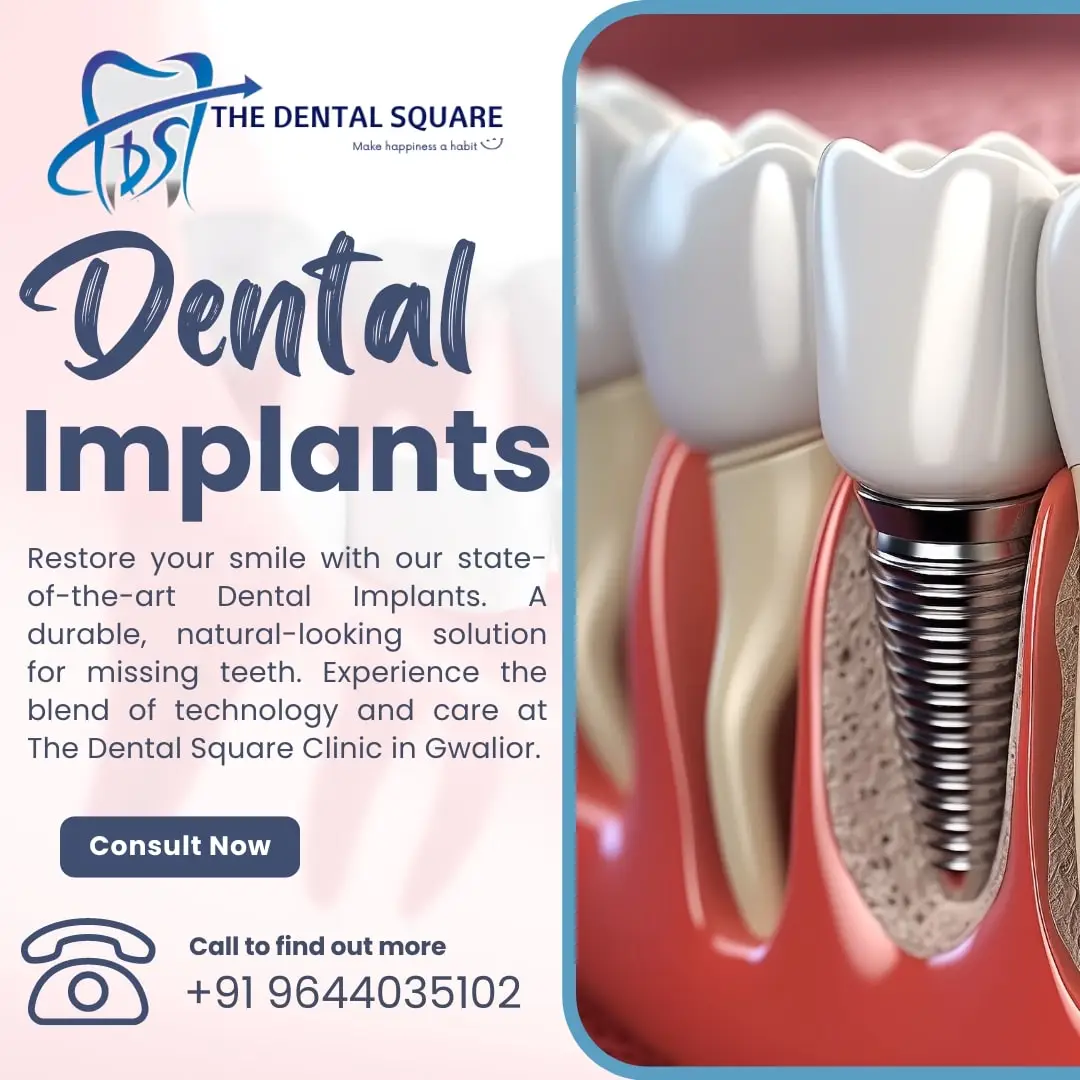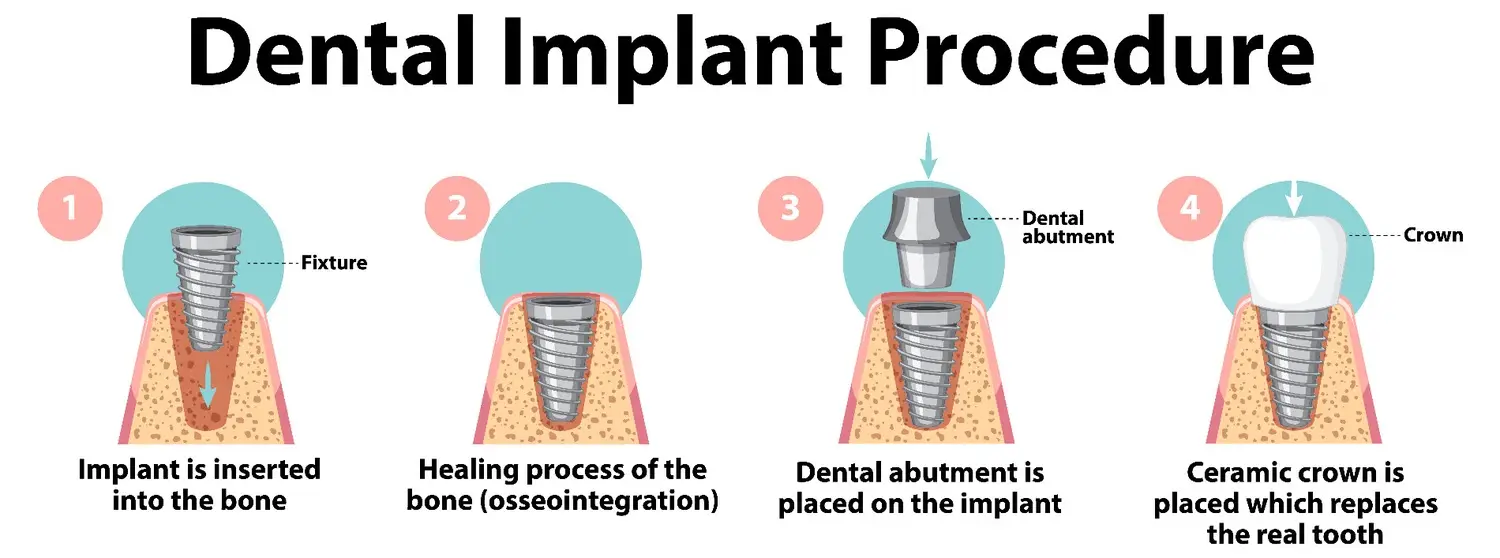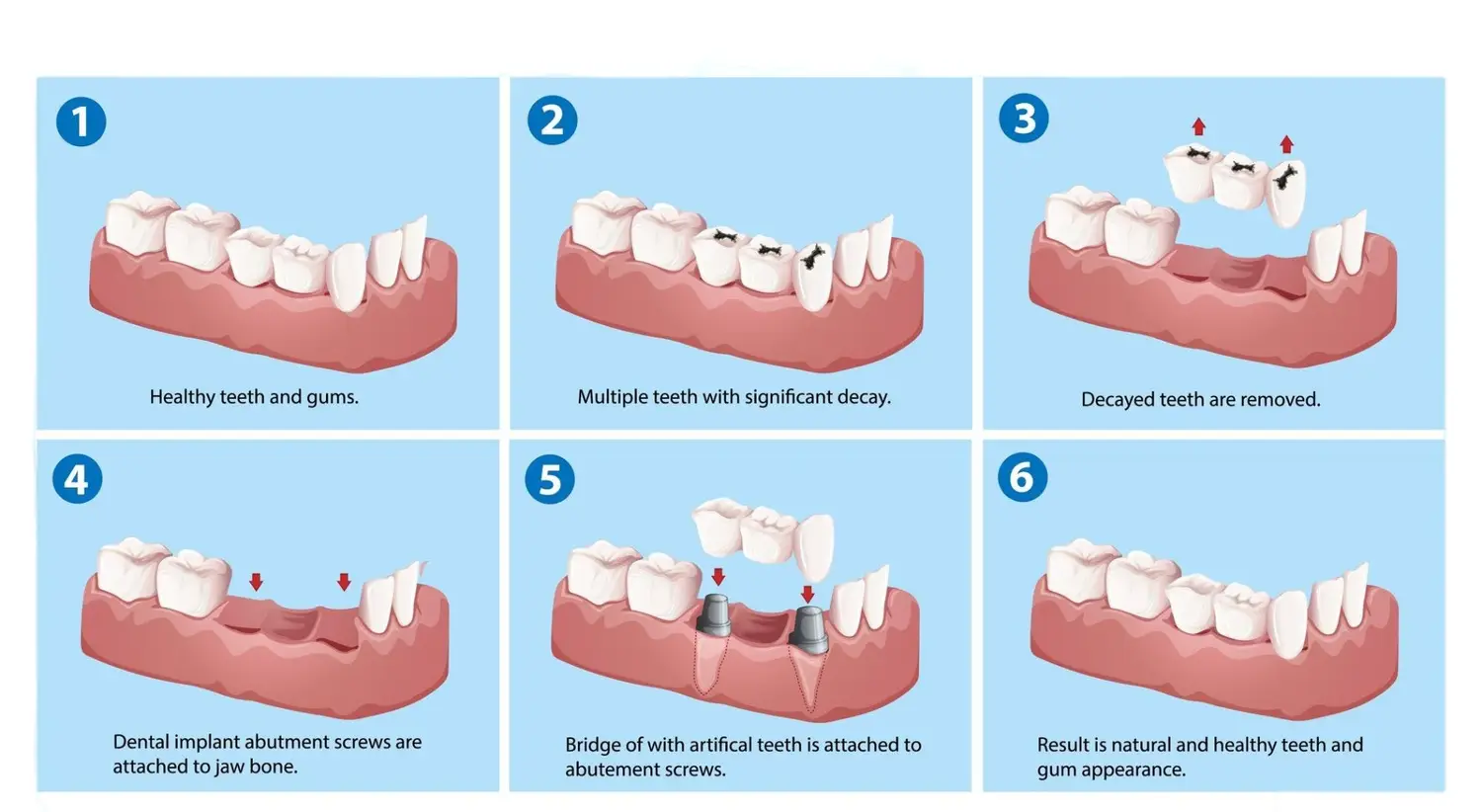
Dental implants have revolutionized the field of dentistry, offering a permanent solution for missing teeth that look, feel, and function like natural teeth. As one of the most advanced methods for tooth replacement, dental implants provide not only aesthetic benefits but also crucial functional advantages, helping patients regain their confidence and quality of life. In this article, we will delve into what dental implants are, why they are necessary, the different types of dental implants, and the steps involved in the implant procedure. Meet with Best Dental implant Dentist in Gwalior
What is a Dental Implant?
A dental implant is a titanium post that is surgically placed into the jawbone beneath the gum line to serve as a replacement for the root of a missing tooth. Once the implant is in place, it allows the dentist to mount a replacement tooth or bridge over it. Dental implants are designed to fuse with the jawbone, providing a stable and sturdy foundation for artificial teeth. This process, known as osseointegration, ensures that the implant integrates seamlessly with the bone, making it a permanent and reliable solution for tooth loss.

Dental implants are composed of three main parts:
- The Implant: A screw-like post made of titanium that is surgically inserted into the jawbone. It serves as the root of the new tooth.
- The Abutment: A connector placed on top of the implant, which holds and supports the crown.
- The Crown: The visible part of the tooth, usually made of porcelain or ceramic, that is attached to the abutment. The crown is designed to match the appearance of the natural teeth.
The Need for Dental Implants
Dental implants are essential for individuals who have lost one or more teeth due to injury, decay, periodontal disease, or other reasons. The loss of a tooth can have significant consequences on both oral health and overall well-being. Here are some of the key reasons why dental implants are necessary:
- Restoration of Function: Missing teeth can make it difficult to chew and speak properly. Dental implants restore the full functionality of the mouth, allowing patients to eat their favorite foods and speak with clarity.
- Prevention of Bone Loss: When a tooth is lost, the jawbone in the area of the missing tooth begins to deteriorate due to lack of stimulation. Dental implants stimulate the bone, preventing bone loss and preserving the facial structure.
- Preservation of Adjacent Teeth: Unlike traditional bridges, dental implants do not require the alteration of adjacent teeth. This preserves the natural teeth and maintains overall dental health.
- Improved Aesthetics and Confidence: Dental implants look and feel like natural teeth, helping to restore a patient’s smile and confidence. They eliminate the worry of dentures slipping or falling out, providing a more secure and comfortable solution.
- Long-Term Solution: Dental implants are a durable and long-lasting solution, often lasting a lifetime with proper care. They are more reliable and stable compared to other tooth replacement options like dentures or bridges.
Types of Dental Implants
There are several types of dental implants available, each designed to address specific dental needs. Understanding the different types of implants can help patients choose the best option for their situation.
- Endosteal Implants: Endosteal implants are the most common type of dental implant. They are surgically placed directly into the jawbone and are typically shaped like small screws. After the gum tissue heals, a second surgery is performed to attach the abutment and crown to the implant. This type of implant is ideal for patients with a healthy jawbone that can support the implant.
- Subperiosteal Implants: Subperiosteal implants are placed under the gum but on or above the jawbone. This type of implant is used for patients who do not have enough healthy jawbone and cannot or do not want to undergo a bone augmentation procedure. Subperiosteal implants are less common but are a good option for those with insufficient bone height.
- Zygomatic Implants: Zygomatic implants are the least common type and are used when there is not enough bone in the upper jaw to support traditional implants. Instead of being placed in the jawbone, zygomatic implants are anchored in the cheekbone (zygoma). This complex procedure is typically used as a last resort when other options are not viable.
- All-on-4 Implants: The All-on-4 implant technique is used to replace all of the teeth in either the upper or lower jaw. This method uses only four implants to support a full arch of teeth, making it a cost-effective and time-saving solution for patients who need extensive dental restoration.
The Dental Implant Procedure
The dental implant procedure involves several steps, each crucial to the success of the implant. Here’s an overview of the process:
- Initial Consultation and Evaluation: The first step in getting a dental implant is a thorough examination by a dentist or oral surgeon. This evaluation includes dental X-rays, 3D images, and models of the mouth and jaw to determine the best placement for the implant. The dentist will also assess the patient’s overall health, bone density, and gum condition to ensure they are a good candidate for the procedure.
- Bone Grafting (if necessary): If the jawbone is not thick enough or too soft to support an implant, a bone graft may be required. Bone grafting involves adding bone or a bone-like material to the jaw to create a solid foundation for the implant. This step is crucial for ensuring the long-term success of the implant.
- Placement of the Implant: During the surgical procedure, the dentist will make an incision in the gum to expose the bone, drill a hole into the jawbone, and place the implant post. The gum is then stitched back over the implant. After this step, the implant is left to heal for several months while osseointegration occurs.
- Placement of the Abutment: Once the implant has fully integrated with the bone, a second surgery is performed to attach the abutment. The dentist will make a small incision in the gum to expose the implant and place the abutment on top. The gum tissue is then closed around the abutment, but not over it.
- Placement of the Crown: After the gums have healed, the final step is the placement of the crown. The dentist will take impressions of the patient’s teeth to create a custom crown that matches the color and shape of the surrounding teeth. The crown is then attached to the abutment, completing the procedure.
- Aftercare and Maintenance: Proper care is essential to the longevity of dental implants. Patients should maintain good oral hygiene by brushing and flossing regularly, attending routine dental check-ups, and avoiding habits that could damage the implant, such as chewing on hard objects.
Benefits of Dental Implants
Dental implants offer numerous benefits, making them the preferred choice for tooth replacement:
- Natural Appearance: Implants look and feel like natural teeth, providing an aesthetically pleasing result.
- Stability and Comfort: Implants are securely anchored in the jawbone, eliminating the discomfort and inconvenience associated with removable dentures.
- Durability: With proper care, dental implants can last a lifetime, making them a cost-effective long-term solution.
- Improved Oral Health: Implants do not require the reduction of adjacent teeth, preserving the health and integrity of the natural teeth.

Mentioning Dr. Sudhanshu Kushwah
For those in Gwalior seeking expert care in dental implants, Dr. Sudhanshu Kushwah at The Dental Square Clinic is a leading specialist in the field. With extensive experience in implantology, Dr. Kushwah provides personalized treatment plans to ensure the best outcomes for each patient. His clinic is equipped with cutting-edge technology, offering a comfortable and efficient environment for all dental procedures, including dental implants. To learn more or schedule a consultation, visit The Dental Square Clinic.
Dental implants are a life-changing solution for those dealing with tooth loss, offering both functional and aesthetic benefits. With the expertise of a skilled professional like Dr. Kushwah, patients can enjoy a restored smile and improved quality of life.




